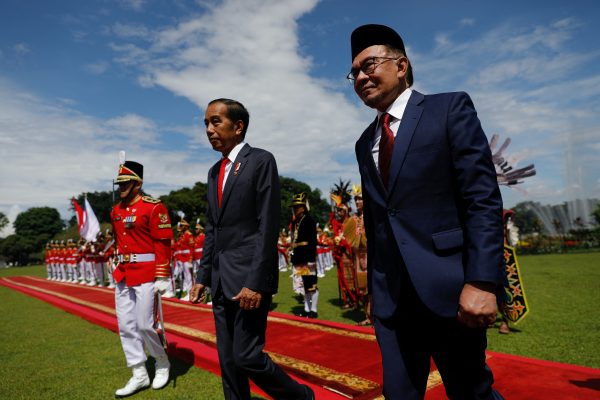Then, once the voting was over, Indonesia seemed to revert to its cooperative, moderate mean. The defeated presidential candidate Prabowo Subianto was dealt into President Joko Widodo’s government as defence minister and cut his ties to Islamists as the Widodo government began a crackdown on the Islamist opposition.
But despite the relative political placidity of Widodo’s second term, it would be premature to conclude that polarisation was a flash in the pan. Ahead of the February 2024 presidential election, polls show that the two strongest candidates are Widodo’s ally, the governor of Central Java province, Ganjar Pranowo, and Anies Baswedan, the former governor of Jakarta who has found his political groove as the candidate of more conservative Muslims who dislike Jokowi.
If Ganjar and Anies secure nominations, a contest between them could quickly reignite Indonesia’s latent cultural conflicts. Islamists would line up behind Anies, and pluralists and religious minorities would flock to Ganjar. Everybody else — including Prabowo, if he too secures a candidacy — would be stuck in the middle, being told by ideologues on both sides that equivocation isn’t an option. What could start as a relatively civil contest could well turn nasty.
The fact is that elite cooperation and consensus-building between elections can only paper over deep and abiding social divisions for so long, as Dan Slater emphasises in this week’s lead article which highlights growing affinities between the structure of democratic competition in Indonesia and Malaysia.
Slater takes a glass half-full view of the political changes ushered in by the fall of Malaysia’s Barisan Nasional (BN) in the wake of the 2018 and 2022 general elections, writing that ‘authoritarian hegemony has finally died in Malaysia just as it did decades ago in Indonesia’ with the electorate ‘now splintered behind a handful of parties rather than concentrated behind a hegemonic party’.
There are catches, though. The first is that just as Suharto’s party vehicle Golkar dealt itself back into governing coalitions after the end of the New Order regime, so has UMNO ‘pulled off a similar trick’. Prime Minister Anwar Ibrahim’s Pakatan Harapan coalition is propped up in part because of the support of UMNO, now led by Zahid Hamidi, a party warlord from central casting who faces serious charges of corruption. With both men needing each other’s support to maintain their positions, political realities dictate that Anwar’s promises of a political renewal are compromised from the get-go.
Anwar’s voters, though, are mostly willing to forgive his realpolitik approach because of another way in which Malaysian political dynamics have come to resemble Indonesia’s. ‘Far more than during Malaysia and Indonesia’s authoritarian eras’, Slater writes, ‘the divide between government and opposition is assuming a worrisome ethno-religious colour’.
The deep racial and religious divides in Malaysian society have historically had complicated political effects — encouraging ugly identity politics while incentivising political coalitions to maximise their electoral support by maintaining multi-racial political coalitions. Even the BN government, Slater points out, balanced its core party UMNO’s upholding of Malay special rights with its need to co-opt minorities via alliances with Chinese, Indian and East Malaysian coalition partners. The opposition, meanwhile, also strived with variable success in a reformist multiracial coalition that mirrored BN’s.
But the post-2018 collapse of BN has now, after the 2022 polls, led to a reordering of coalitions in which the opposition to Anwar’s multiracial government is effectively an alliance between Malay-chauvinist and Islamist political forces.
How pluralists cope with the new terms of political competition will matter almost as much as the opposition’s demagoguery. As Slater cautions, ‘we still do not know if either Malaysia or Indonesia will succeed at fending off the worst aspects of polarisation without plunging straight back into authoritarian hegemony’. Certainly, there has been a tightening of space for dissent in Indonesia under the banner of a crackdown on Islamism. If Pakatan Harapan’s anxieties about the threat posed to Malaysian multiculturalism by the opposition persist, pluralists might yet start to rationalise similar hard-knuckled tactics. So much is yet uncertain: ‘[f]or Malaysia, polarising pluralism is uncharted waters’, writes Slater.
There is no institutional magic formula for fixing these problems. Efforts at electoral reform in Malaysia remain unfinished business from Pakatan Harapan’s first stint in office between 2018 and 2020, with political scientists disagreeing about whether a shift towards proportional representation would soften or exacerbate communalist politics.
Institutional engineering is an imperfect science, yet the question of electoral system design will surely have to be revisited given how unsustainable the terms of post-2022 political competition in Malaysia appear to be.
The EAF Editorial Board is located in the Crawford School of Public Policy, College of Asia and the Pacific, The Australian National University.

